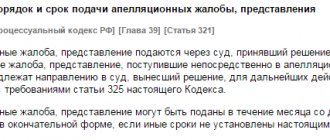Concept of appeal
An appeal means:
- a form of appealing court decisions aimed at eliminating factual and legal errors;
- a mechanism for reviewing court decisions to verify their legality, validity and fairness;
- the stage of criminal proceedings, in which the final court decision that has not entered into force is verified;
- stage of consideration of decisions made on issues related to criminal proceedings (use of coercive measures, suppression);
- legal and procedural institution - a set of rules of procedural law governing the review of a court decision that has not entered into force.
Are you an expert in this subject area? We invite you to become the author of the Directory Working Conditions
Contents of the document
The criteria for the form and content of the submission are reflected in Article 389.6 of the Code of Criminal Procedure of the Russian Federation. Prosecutor's office employees use a standard form developed at the level of a government agency.
The document must indicate several points:
- Name of the judicial authority to which the appeal is sent.
- Personal data of the citizen who submits the appeal, his procedural status, residential address.
- Details of the court decision, information about the body that issued it.
- Arguments of the person, reasons for updating the decision.
- List of attached documents.
- Citizen's signature.
The applicant may request that the appellate court consider evidence that has already been previously examined by the court. If there are those that were not considered, the reason for the impossibility of transferring them at the first meeting is described.
Stages of appellate review
The procedural form of appeal proceedings involves the following sequence of actions:
- sending an appeal (submission) by an authorized person within the period prescribed by law;
- notifying interested parties about received complaints;
- referral of a criminal case by the court of first instance to a higher court;
- preparation for appeal consideration of a criminal case;
- verification at a court hearing of a court decision according to the rules of the court of first instance;
- making a final decision;
- appealing a court decision.
Application deadlines
After a judicial act is issued, a period specified by law is given for filing a motion. It is 10 days. If the deadlines are not met, the document will not be considered. But the court, at its discretion, can restore them.
Evidence of a valid lack of timely treatment is most often provided by other participants in the process. Public prosecutors are subject to particularly stringent requirements. Therefore, they need to provide as much information as possible about missed deadlines.
Characteristics of an appeal
Modern domestic appeal in criminal cases We have already completed an essay
The presumption of innocence in criminal proceedings in Russia has the following properties in more detail:
Finished works on a similar topic
Course work The appellate authority in criminal proceedings 410 ₽ Abstract The appellate authority in criminal proceedings 270 ₽ Test work The appellate authority in criminal proceedings 200 ₽
Receive completed work or specialist advice on your educational project Find out the cost
- a new trial in a criminal case (private issue), the results of which may result in a new decision;
- division of powers between appellate, cassation and supervisory courts;
- separation of factual and legal errors as grounds for reviewing a case in higher courts;
- appeal proceedings are the last instance in which a court decision can be overturned due to inconsistency with the actual circumstances of the case;
- Suspension – suspension of execution of a court decision against which a complaint has been filed. This property is inherent only in final court decisions (part 1 of article 389.8, part 4 of article 389.2 of the Code of Criminal Procedure of the Russian Federation).
Note 1
A number of final decisions do not have suspensiveness if it concerns the detention of the defendant in custody. Thus, acquittals and convictions are subject to immediate execution, by which the convicted person is not sentenced, or he is released from it, or a punishment not related to isolation from society is imposed, or a deferment of serving the sentence is granted (Article 311 of the Code of Criminal Procedure of the Russian Federation).
What will be the new appeal and cassation in criminal proceedings?
For almost a year now, the entire Russian legal community has been living in anticipation of the upcoming significant changes in the judicial system proposed by the Supreme Court of the Russian Federation. The innovations that will be adopted by the bill coming into force this fall will affect all procedural codes, since they involve the creation of a new judicial unit - separate courts of appeal and cassation. However, among representatives of the legal profession, the greatest interest was expectedly aroused by the institution of full cassation in criminal proceedings, new to the Russian legal system, and the procedure for appealing.
Let's try to answer questions about what will change in the appellate and cassation appeals in criminal proceedings.
1. How will the new procedure for filing appeals and cassation complaints be regulated?
From September 1, 2021, two updated chapters of the Code of Criminal Procedure of the Russian Federation – 45.1 and 47.1 – will be devoted to appealing decisions made by courts in criminal proceedings. In addition, additional regulation in order to minimize possible errors of law enforcement officials at the transitional stage will be provided by the Resolution of the Plenum of the Supreme Court of the Russian Federation “On the application of the norms of Chapter 47.1 of the Criminal Procedure Code of the Russian Federation governing proceedings in the cassation court,” approved on June 25, 2019. It is not excluded that that a similar Resolution will be adopted to clarify the procedure for appealing in criminal proceedings, but in general this procedure does not change so significantly (more on this below).
2. Where will the new cassation and appeal courts of general jurisdiction be located?
By the fall of this year, 7 courts of appeal should be created (in Moscow, St. Petersburg, Sochi, Nizhny Novgorod and Novosibirsk, a military court of appeal - in the Moscow region (Vlasikha) and 10 cassation courts, which will be located in Saratov, Moscow, St. Petersburg, Krasnodar, Pyatigorsk, Samara, Chelyabinsk, Kemerovo and Vladivostok, and the military one in Novosibirsk.
3. When will the new courts start operating?
The exact start date for the new vessels has not yet been determined. Cassation and appeal courts of general jurisdiction can be considered formed from the date of appointment of at least 1/2 of the established number of judges of the corresponding court, however, the final decision on the date of commencement of their activities must be made by the Plenum of the Supreme Court of the Russian Federation no later than October 1, 2021. It is worth noting that that the process of forming court personnel is almost over. In particular, as early as October 15, 2021, all chairmen of the new judicial bodies were appointed (mostly former chairmen of regional courts). In addition, at the moment, more than 560 candidates for the position of judges of cassation and appeal courts have been recommended for appointment, 330 positions remain vacant.
4. What will change in the criminal appeal process?
In many respects, the procedure and deadlines for appeal will remain the same. The changes will affect only two types of solutions:
- a verdict or other decision of the supreme court of a republic, a regional or regional court, a court of a federal city, a court of an autonomous region, a court of an autonomous district will be appealed to the judicial panel for criminal cases of the court of appeal of general jurisdiction;
- verdict or other decision of the district (naval) military court - to the military court of appeal.
Otherwise, the jurisdiction and procedure for appealing court decisions that have not entered into force with filing a complaint within 10 days through the court of first instance remains. The deadlines for consideration of appeals will also remain unchanged. For the new judicial level of the appellate courts, the period for starting the consideration of the complaint will be no more than 45 days from the date of its receipt by the appellate court.
Thus, all interim court decisions and sentences of magistrates will be appealed on appeal to a district court (or a court equivalent to it), and similar decisions and sentences of district or equivalent courts will be appealed to a court of a constituent entity of the Russian Federation or a court equivalent to it.
5. What will change in the cassation procedure in criminal cases?
From September 1, 2021, there will be two cassation appeal procedures in criminal proceedings - complete and selective cassation. In relation to a number of decisions (sentences and other final decisions of courts of first instance, as well as appeal sentences), consideration of complaints in cassation will become mandatory, since the cassation judge will not be vested with the authority to decide the presence or absence of grounds for transferring a cassation appeal to the court the act of the lower court to the court of cassation for consideration on the merits. All cassation complaints that meet the formal requirements for the authority of a person to file a complaint and its content are subject to consideration.
Other court decisions, called “interim” in the law (for example, on the appointment of a forensic examination or on the transfer of jurisdiction), with the exception of decisions made during the trial and not subject to independent cassation appeal, are reviewed in the order of selective cassation.
Four bodies will be given the power to review decisions in criminal cases through the cassation procedure:
1. The judicial panel for criminal cases of the cassation court of general jurisdiction in relation to:
- verdict or other court decision of the magistrate;
- verdict or other court decision of the district court;
- an appeal verdict or other court decision of the supreme court of a constituent entity of the Russian Federation, rendered on appeal.
2. Judicial panel for criminal cases of the military court of cassation in relation to:
- verdict or other final court decision of the garrison military court;
- an appeal verdict or other court decision of a district (naval) military court issued on appeal.
3. Judicial Collegium for Criminal Cases of the Armed Forces of the Russian Federation in relation to:
- a verdict or other court decision of the supreme court of a constituent entity of the Russian Federation, issued in the course of criminal proceedings as a court of first instance, including in cases where it was not the subject of an appeal review;
- an appeal verdict or other court decision of a court of appeal of general jurisdiction.
4. The Judicial Collegium for cases of military personnel of the Armed Forces of the Russian Federation in relation to:
- a verdict or other court decision of a district (naval) military court issued during criminal proceedings as a court of first instance, including in cases where it was not the subject of verification on appeal;
- an appeal verdict or other court decision of a military court of appeal.
In addition, the Supreme Court of the Russian Federation will retain the powers of the instance carrying out the so-called second cassation in relation to the decisions of the cassation courts in relation to:
- a verdict or other court decision of a magistrate, district court, garrison military court, if previously these decisions were the subject of consideration by a cassation court of general jurisdiction or a military cassation court;
- an appeal verdict or other court decision of the supreme court of a constituent entity of the Russian Federation, a district (naval) military court, rendered on appeal, if previously these decisions were the subject of consideration by a cassation court of general jurisdiction or a military cassation court;
- determinations of the judicial panel for criminal cases of the cassation court of general jurisdiction, determinations of the military court of cassation, issued as a result of the review of court decisions.
Depending on the cassation procedure, the procedure for filing a complaint and preparing it for trial varies significantly:
1) In the order of full cassation, the complaint is filed through the court of first instance, which adopted the decision being appealed, which is entrusted with the responsibility for preparing the court hearing of the cassation court. Also, the court of first instance is directly charged with the obligation to transfer the complaint or presentation for consideration to the appropriate court within a reasonable time (more specific requirements for the time period are not established) with notification of the parties. After receiving a criminal case with a cassation appeal, the cassation judge within 20 days decides on the date of scheduling the hearing. At the same time, the cassation judge also retains the authority to return the complaint or presentation without consideration to the person who filed it, in order to eliminate the identified shortcomings if it does not meet the requirements for the content of the cassation appeal.
2) In the order of selective cassation, complaints are submitted directly to the court of cassation. The judge of the court of cassation examines the cassation appeal within 1 month if the case was not requested, 2 months - if it was requested (for complaints filed with the Supreme Court of the Russian Federation, these periods increase to 2 and 3 months, respectively) and makes a decision to refuse the appeal. transfer, if there are no grounds for reviewing court decisions in cassation or transfer of a cassation appeal, presentation with a criminal case for consideration in a court session of a court of cassation.
Thus, it is the cassation courts of general jurisdiction and the judicial collegium of the Armed Forces of the Russian Federation that will review in the third instance the decisions of lower courts that have entered into legal force (including sentences of magistrates), and the supreme courts of the constituent entities of the Russian Federation will completely lose their cassation powers upon entry into force changes made.
6. By what rules will complaints be considered if the decision was made or came into force before the start of the new appellate and cassation courts?
The legislator and the Supreme Court of the Russian Federation draw attention to the limited retroactivity of the innovations under consideration. In particular, all appeals and petitions filed before the entry into force of the new provisions of the Code of Criminal Procedure of the Russian Federation are considered in the old order.
A special rule is also provided for the cassation instance: if the appealed court decision entered into legal force before the start of the activities of cassation courts of general jurisdiction, they can be appealed, respectively, to the cassation court of general jurisdiction (cassation military court) or to the Supreme Court of the Russian Federation, but only in the following manner: selective cassation. At the same time, cassation complaints and submissions already submitted to the presidiums of the supreme courts of republics, regional, regional and equivalent courts before the start of work of cassation courts of general jurisdiction are subject to consideration according to the rules provided for by Chapter 47.1 of the Code of Criminal Procedure of the Russian Federation, which was in force before the start of work of cassation courts general jurisdiction. In addition, if the verdict or other decision of the Supreme Court of the subject before the changes in question came into force by the Supreme Court was already appealed and an appellate assessment was given, the parties have the right to file a cassation appeal, presentation to the Judicial Collegium for Criminal Cases or the Judicial Collegium on cases of military personnel of the Supreme Court of the Russian Federation.
7. Are the rules for handling supervisory complaints changed in any way?
Innovations in the judicial system will affect the supervisory authority only indirectly (in connection with a change in jurisdiction): now the Presidium of the Supreme Court of the Russian Federation will have the right to review court decisions of the appellate board of the Supreme Court of the Russian Federation, rulings of the judicial board of the Supreme Court of the Russian Federation issued by them in cassation proceedings and decisions of the Presidium of the Supreme Court RF. Otherwise, the procedure for filing and considering supervisory complaints will not change.
To summarize, we note that in general the initiative of the Supreme Court of the Russian Federation looks reasonable. At first glance, one can come to the conclusion that this will allow judges of the appellate and cassation instances to more objectively evaluate the verdicts of their colleagues, since they will report to different superiors - the chairmen of the courts, and, therefore, will not be so strongly bound by the statistical wishes and opinions of the latter. However, crooked law enforcement has repeatedly ruined many seemingly liberal legislative changes in the field of criminal proceedings. Unfortunately, the new procedure applies only to sentences and other final court decisions, but interim court decisions (including numerous decisions to choose a preventive measure in the form of detention) will be reviewed in fact according to the old rules, that is, one can hardly expect that the negative statistics of the widespread satisfaction of all requests of investigators at the pre-trial stage of criminal proceedings will be significantly corrected.
We can only hope that the plan of the Supreme Court of the Russian Federation, aimed at increasing the level of independence, impartiality and competence of judges contained in the adopted law, will be implemented in full, and the new appeal procedure will provide a significant number of persons whose rights have been violated with an additional opportunity to appeal in court. the court's attention to significant violations of the law committed by lower authorities.
Lawyer, senior partner of the Law Office "ZKS" Andrey Grivtsov Trainee of the Law Office "ZKS" Sofya Smirnova
Courts of appeal
The courts of appeal act as:
- district (city) courts - for decisions made by justices of the peace;
- judicial panels for criminal cases of regional (territorial) courts - for all decisions of district courts and interim decisions of regional (territorial) courts;
- Judicial Collegium for Criminal Cases of the Supreme Court of the Russian Federation On this topic, we have already completed course work
Proceedings in administrative cases considered by the Disciplinary Collegium of the Supreme Court of the Russian Federation in more detail - for final decisions of regional (territorial) courts; - Appeal Board of the Supreme Court of the Russian Federation On this topic, we have already completed an abstract
The Supreme Court of the Russian Federation and the system of courts of general jurisdiction in more detail - for decisions of judges of the Supreme Court of the Russian Federation On this topic, we have already completed
an abstract
of the Supreme Court of the Russian Federation in more detail.
Submitting objections
When the prosecutor submits a presentation, other participants in the case may submit their own objections in response to it. Verbal disagreements are documented in writing.
It is important to submit them within the deadline set by the court. It is prescribed in the judicial notice along with the procedure and rights of citizens. A copy of the submission is sent along with it.
A set of documents is sent to each of the parties: the suspect, the accused. If they are in custody, the papers are received at the place of execution of the preventive measure.
Lawyers and representatives also have the right to file an objection. They are sent copies of the document.
What is written in the document
The objection notes:
- name of the court to which and through which the appeal is submitted;
- information about the person submitting the document (full name, procedural status, place of residence, contact information);
- circumstances of the criminal case;
- the decision being appealed;
- date of preparation of the submission, information about the person who sent it;
- grounds for objection;
- disagreement with the justifications of the prosecutor's office;
- date and signature.
It is important to adhere to the same points and order of presentation of events that are present in the presentation. Each reason must be clearly stated. Even if you file an objection, you can prepare an appeal. Documents can complement each other.
There is no need to prepare an objection if the party agrees with the position of the prosecutor's office. But at the same time he insists that the decision is too lenient. Likewise, there is no need to formulate an objection when expressing the opinion that a position is too harsh.
Composition of the appellate court
Criminal cases on appeal can be considered either by a single judge or by a panel of judges (Part 3 of Article 30 of the Code of Criminal Procedure of the Russian Federation). Individual appeal proceedings are carried out by:
- district court judge - on final and interim decisions of magistrates;
- judge of a regional (territorial) court - on interim decisions of the district court and final decisions in cases of crimes of minor or medium gravity;
- judge of the Supreme Court of the Russian Federation - on final decisions in cases of crimes of minor or medium gravity.
Procedure
The filing procedure consists of several stages.
- After the court makes a decision, the prosecutor prepares a presentation within 10 days. You need to contact the court that accepted the document.
- The court notifies the other participants in the proceedings that a motion has been filed. They are given copies and their rights to file a written objection are explained.
- Time limits are established within which the parties can file an objection.
- Submitted objections are considered within the framework of the case under the Criminal Code of the Russian Federation.
- When the deadline for appeal expires and it is no longer possible to file objections, the materials are sent for consideration by the court as part of the appeal.
While the case is in court, as well as within 5 days before the hearing begins, the prosecutor has the right to send an additional submission. This is possible in situations where:
- the submission was submitted in a brief form in order to comply with the deadlines for appeal;
- there is a need to make clarifications or additions to respond to objections.
The document should not contain requirements that worsen the position of the accused in the absence of such a clause in the brief submission.






